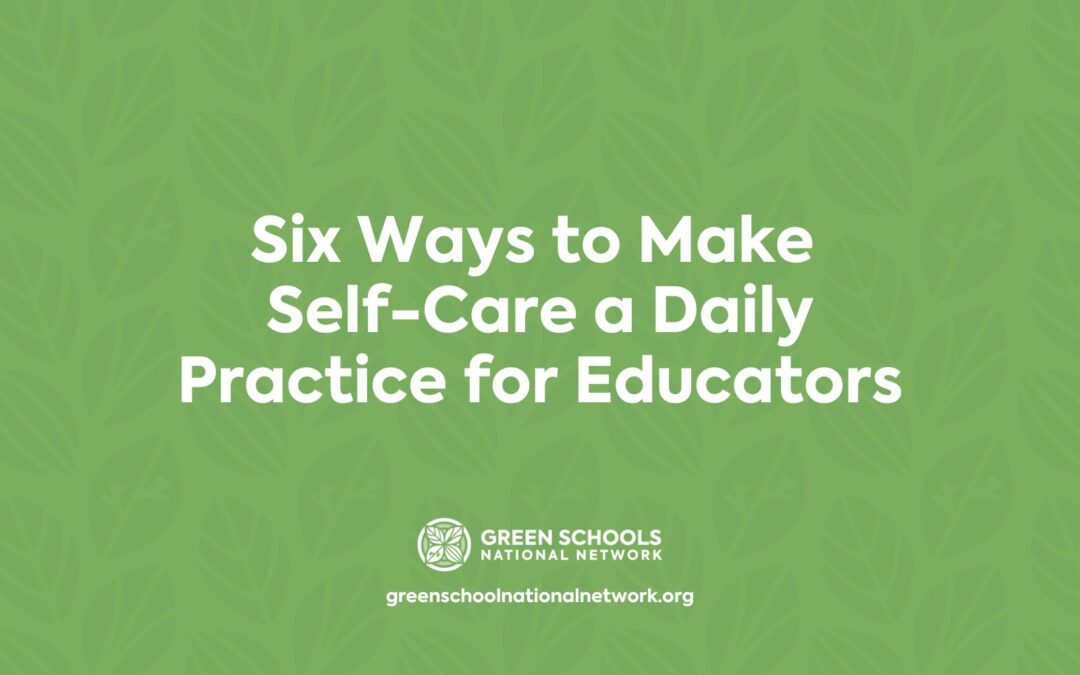Education is a rewarding, yet exhausting profession. Educators often put students and their families first, giving of their time, energy, and resources, before meeting their own needs. This isn’t healthy or sustainable. Many passionate educators cut their careers short because of stress and burnout.
Prioritizing self-care, health, and wellness is essential to complement your education practice – just as much, if not more so, than professional development. The approaching winter holidays and the end of another year is the perfect time to invest in some much needed self-care. Make an early new year’s commitment to practice self-care throughouthttps://greenschoolsnationalnetwork.org/wp-admin/post.php?post=223886&action=edit# the year by adding one or more of the six ideas below to your daily routine.
Get Moving
Exercise is beneficial to your physical and mental health. It boosts your mood, improves your focus, and reduces anxiety. The key is finding a movement that moves you. If you need a little motivation to get started, try taking an exercise class at a local gym or studio or join a running, walking, or bicycling group. The community and camaraderie will boost your confidence and help you stick with your new routine. If you’re bored with your current exercise regime, try a new sport or activity, like tennis, golf, racquetball, or even rock climbing.
Feed Body and Soul
Nourishing your body and mind is essential for overall health and well-being. The food we eat plays a significant role in how we feel and function every day. Changing eating habits can be hard, so start small. Visit your local farmers market for inspiration, commit to trying a new fruit or vegetable once a week, or explore recipes from a global cuisine you’ve never tried before.
Nourishing your soul is just as important. An easy way to do this is to adopt a daily mindfulness practice. Start and/or end your day with yoga, meditation, or some simple breathing or sensory exercises. Another great activity is journaling. In addition to daily reflections, you can identify three positive things that happened, express gratitude toward someone or something that made your day better or jot down inspirational quotes.
Nurture Relationships
Humans are social creatures. We thrive on community and connections with family, friends, and colleagues. Nurturing these relationships is important and there are many ways to do so without huge time commitments. Make a coffee date with a friend or two, hold a weekly family game night, or start a monthly rotating supper club. If you have more time, consider gathering a group together to participate in a local volunteering event or community activity, like a 5K run/walk.
Pursue Your Passions
Hobbies often take a backseat to life and work; however, pursuing different interests can stimulate creativity and critical thinking. If you’ve put a hobby on the back burner, now’s the time to reengage! If you’re looking for something new to try, check out your local community college or community center for evening or weekend classes. These are great opportunities to learn an art or a craft like painting or pottery or indulge more intellectual interests such as exploring local history.
Play Outdoors
Research abounds on the mental health benefits of getting outdoors and engaging with nature. You don’t have to go far from home to reap these benefits either. Plant a backyard garden or a container garden on your patio or balcony to get your hands dirty while getting your fill of Vitamin N. Download an app like Merlin Bird ID or iNaturalist and challenge yourself to identify the flora and fauna that call your neighborhood home. Take your mindfulness practice outdoors by finding a solo sit spot and quietly observing and reflecting on your surroundings.
Looking for some adventure instead? Visit your local outdoor retailer and inquire about opportunities to go canoeing or kayaking, rafting, and backpacking, to name a few. These places often offer guided trips and gear rentals and can point you to other local guide services if they don’t offer an activity that you’re interested in.
Rest and Recharge
Nothing beats a little bit of alone time, and everyone can use a little more of it. Carve out time every day to focus on yourself and no one else. Listen to music or a podcast, read a book, do some puzzles, or bake a sweet treat. Whatever it is, do something that relaxes you and brings you joy. And don’t hesitate to remind the people around you that this is your time. Setting boundaries is important when it comes to self-care and when you consistently enforce these boundaries, will you find that your friends and loved ones will respect them.
Check out this GSNN blog post for additional self-care resources.
A well-rounded wellness program that emphasizes self-care contributes toward a positive school culture and climate. Download the GreenPrint to learn about additional best practices that support culture and climate.

